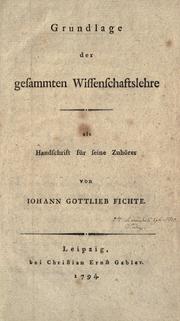 | |
| Author | Johann Gottlieb Fichte |
|---|---|
| Original title | Grundlage der gesammtena Wissenschaftslehre |
| Language | German |
| Subject | Epistemology |
Publication date | 1794/1795 |
| Publication place | Germany |
| Media type | |
| Pages | 324 (1982 Cambridge University Press edition) |
| ISBN | 978-0521270502 |
| a gesamten in modern German. | |
Foundations of the Science of Knowledge ( German: Grundlage der gesammten Wissenschaftslehre) is a 1794/1795 book by the German philosopher Johann Gottlieb Fichte. Based on lectures Fichte had delivered as a professor of philosophy at the University of Jena. [1] Fichte created his own system of transcendental philosophy in his book. [2]
Ideas
Science of Knowledge has first established Fichte's independent philosophy. [3] The contents of the book, which were divided into eleven sections, were crucial in the way the thinker has grounded philosophy as - for the first time - a part of epistemology. [4] In the book, Fichte has also claimed that an "experiencer" must be tacitly aware that he is experiencing in order to lead to "noticing". [5] This articulated his view that an individual's experience is essentially the experiencing of the act of experiencing so that his so-called "Absolutely Unconditioned Principle" of all experience is that "the I posits itself". [5]
Reception
In 1798, the German romantic Friedrich Schlegel identified the Wissenschaftslehre, together with the French Revolution and Johann Wolfgang von Goethe's Wilhelm Meister, as "the most important trend-setting events (Tendenzen) of the age." [6]
Michael Inwood believes that the work is close in spirit to the works of Edmund Husserl, including the Ideas (1913) and the Cartesian Meditations (1931). [7]
The Wissenschaftslehre has been described by Roger Scruton as being both "immensely difficult" and "rough-hewn and uncouth". [1]
See also
References
Notes
- ^ a b Scruton 2000. p. 208.
- ^ "Fichte, Johann Gottlieb | Internet Encyclopedia of Philosophy". Retrieved 2023-12-27.
- ^ Zack, Naomi (2009-09-01). The Handy Philosophy Answer Book. Canton, MI: Visible Ink Press. pp. 224. ISBN 9781578592265.
- ^ Henrich, Dieter (2003). Between Kant and Hegel. Cambridge, MA: Harvard University Press. pp. 208. ISBN 0674007735.
- ^ a b Gottlieb, Gabriel (2016). Fichte's Foundations of Natural Right. Cambridge: Cambridge University Press. p. 141. ISBN 9781107078147.
- ^ Seidel 1993. p. 1.
- ^ Inwood 2005. p. 410.
Bibliography
- Inwood, M. J. (2005). Honderich, Ted (ed.). The Oxford Companion to Philosophy. Oxford: Oxford University Press. ISBN 0-19-926479-1.
- Scruton, Roger (2000). Kenny, Anthony (ed.). The Oxford History of Western Philosophy. Oxford: Oxford University Press. ISBN 0-19-289329-7.
- Seidel, George J. (1993). Fichte's Wissenschaftslehre of 1794. A Commentary on Part 1. Purdue University Research Foundation: Purdue University Press. ISBN 1-55753-017-3.
 | |
| Author | Johann Gottlieb Fichte |
|---|---|
| Original title | Grundlage der gesammtena Wissenschaftslehre |
| Language | German |
| Subject | Epistemology |
Publication date | 1794/1795 |
| Publication place | Germany |
| Media type | |
| Pages | 324 (1982 Cambridge University Press edition) |
| ISBN | 978-0521270502 |
| a gesamten in modern German. | |
Foundations of the Science of Knowledge ( German: Grundlage der gesammten Wissenschaftslehre) is a 1794/1795 book by the German philosopher Johann Gottlieb Fichte. Based on lectures Fichte had delivered as a professor of philosophy at the University of Jena. [1] Fichte created his own system of transcendental philosophy in his book. [2]
Ideas
Science of Knowledge has first established Fichte's independent philosophy. [3] The contents of the book, which were divided into eleven sections, were crucial in the way the thinker has grounded philosophy as - for the first time - a part of epistemology. [4] In the book, Fichte has also claimed that an "experiencer" must be tacitly aware that he is experiencing in order to lead to "noticing". [5] This articulated his view that an individual's experience is essentially the experiencing of the act of experiencing so that his so-called "Absolutely Unconditioned Principle" of all experience is that "the I posits itself". [5]
Reception
In 1798, the German romantic Friedrich Schlegel identified the Wissenschaftslehre, together with the French Revolution and Johann Wolfgang von Goethe's Wilhelm Meister, as "the most important trend-setting events (Tendenzen) of the age." [6]
Michael Inwood believes that the work is close in spirit to the works of Edmund Husserl, including the Ideas (1913) and the Cartesian Meditations (1931). [7]
The Wissenschaftslehre has been described by Roger Scruton as being both "immensely difficult" and "rough-hewn and uncouth". [1]
See also
References
Notes
- ^ a b Scruton 2000. p. 208.
- ^ "Fichte, Johann Gottlieb | Internet Encyclopedia of Philosophy". Retrieved 2023-12-27.
- ^ Zack, Naomi (2009-09-01). The Handy Philosophy Answer Book. Canton, MI: Visible Ink Press. pp. 224. ISBN 9781578592265.
- ^ Henrich, Dieter (2003). Between Kant and Hegel. Cambridge, MA: Harvard University Press. pp. 208. ISBN 0674007735.
- ^ a b Gottlieb, Gabriel (2016). Fichte's Foundations of Natural Right. Cambridge: Cambridge University Press. p. 141. ISBN 9781107078147.
- ^ Seidel 1993. p. 1.
- ^ Inwood 2005. p. 410.
Bibliography
- Inwood, M. J. (2005). Honderich, Ted (ed.). The Oxford Companion to Philosophy. Oxford: Oxford University Press. ISBN 0-19-926479-1.
- Scruton, Roger (2000). Kenny, Anthony (ed.). The Oxford History of Western Philosophy. Oxford: Oxford University Press. ISBN 0-19-289329-7.
- Seidel, George J. (1993). Fichte's Wissenschaftslehre of 1794. A Commentary on Part 1. Purdue University Research Foundation: Purdue University Press. ISBN 1-55753-017-3.